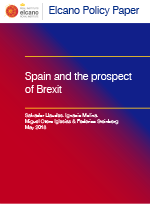Original version in Spanish: España ante el Brexit

Contents
Introduction
1. The withdrawal agreement
1.1 Institutional issues and the timetable of negotiations
1.2 Citizens’ rights
1.3 Budgetary and financial issues
1.4 Territorial issues
2. The future agreement
2.1 The future agreement: economic risks for Spain
2.2 Gibraltar: an opportunity to change the status quo
2.3 Cooperation on defence, security and the promotion of European values
Conclusions
Summary
The decision of the British people to leave the EU has consequences not only for the UK but also for the remaining 27 EU member states, and more particularly for Spain. The ultimate scope of these consequences will greatly depend on the form that the withdrawal finally takes and how the new relationship between the two sides crystallises. Spain, like the other actors involved, has specific stances and problems; some of these have already been addressed and others will need to be addressed over the course of the negotiations. In the pages that follow the various features of this complex process are scrutinised, constantly bearing in mind the EU context led by the European Commission’s chief negotiator, Michel Barnier, in whom Spain, like the other member states, has invested full powers to negotiate on its behalf. After explaining the rationale behind the timetable of negotiations there is an account of the principles underlying the divorce settlement that has been reached and its implications from a Spanish perspective. Next, the type of future relationship that is most in Spain’s interest and the principal risks of the process to Spain’s interests are examined, covering both economic and interpersonal aspects. This is followed by an exploration of the Gibraltar issue, with a proposal for a conceivable way of recasting the status of the Rock, taking advantage of the circumstances around Brexit. Lastly, possible cooperation in the fields of defence, security and the promotion of European values is assessed, before closing with some brief conclusions aimed at underscoring the importance of the negotiations that are underway.
Introduction
On 23 June 2016 the UK held a referendum in which a slim majority of the electorate voted to leave the EU after more than 40 years of membership. Since then, the British side has shown a considerable uncertainty about how to manage its withdrawal; this has been exemplified by the resignation of the Prime Minister, David Cameron, and his replacement by Theresa May,1 a lively debate about whether Brexit should be hard or soft,2 doubts about when to formally trigger the process and the early general election held in May 2017. This saw May retain office at the head of the British government, but in a weaker position, with the Tories losing their parliamentary majority. On the other side, the EU has made a show of unity and self-confidence, certainly greater than the UK had been expecting. From the outset, the European Council adopted a clear and cohesive approach, which included ruling out the possibility of opening talks before receiving official notification of London’s wish to leave the Union, a requirement to respect the indivisibility of the four fundamental freedoms, including the free movement of people, and a stalwart defence of the Commission as the sole negotiator. During the period that included Brexit and the election of Donald Trump as US President, the EU also launched an ambitious ‘reflection process’ regarding its future, something its 27 remaining members have treated with the utmost seriousness.3
On 29 March 2017 Brussels received the official letter triggering Article 50 of the Treaty. Three months later, on 19 June, talks got underway to establish the terms of the divorce, the first phase of which focused on the amount the UK will need to pay to settle its economic commitments to the Union, the rights of citizens post-Brexit and how to avoid there being a hard border between Northern Ireland and the Republic of Ireland, something that could jeopardise the 1998 peace agreement. On 8 December 2017, following six months of negotiations, an eleventh-hour deal was struck between May and Juncker whereby, as we shall see, the EU seems to have secured virtually all its goals. In 2018 a second phase of the talks gets underway; this should settle all outstanding questions relating to the withdrawal agreement, the framework of future relations –including the major issue of how trade relations will be structured– and details concerning the transitionary period.
Although there is still a remote possibility that the UK might choose to remain within the internal market and/or the customs union to fulfil its commitment to preventing a hard border in Ireland (something that could be interpreted as a soft Brexit by the back door), everything at the moment seems to point to a hard Brexit after a transition period of approximately two years, ie, from 2021. A separate possibility that cannot be ruled out over the medium to long term is that of the process being reversed. The greater the economic impact of withdrawal proves (including before Brexit formally materialises), the greater the likelihood of the UK opting to return to the internal market and the customs union, even though this would involve having to accept the free movement of people. And eventually it could even request its readmittance to the Union as a means of having a say in the institutions once again. Accepting the body of EU laws and regulations on a permanent basis without having the ability to influence them would be an extremely tall order for the UK, but a highly convenient solution for the EU and for Spain.
This policy paper analyses Spain’s stance regarding the process. The large numbers of British tourists visiting Spain and the abundance of British residents in the country are matters of common knowledge. Less well known, however, is the profound degree of interdependence in terms of trade and finance, rendering the UK Spain’s largest or second largest overall economic partner (depending on the year), according to the Elcano Royal Institute’s Risks and Opportunities Index.4 For all these reasons, it is in Spain’s interest that relations between the EU and the UK change as little as possible post-Brexit.5 That said, the Spanish desire to achieve a wide-ranging and ambitious agreement with the UK will not under any circumstances jeopardise the unity of the EU´s support for the chief negotiator for the Commission, the Frenchman Michel Barnier. A strong and ever-more integrated EU has always been Spain’s main priority. And this takes precedence over relations with the UK, however important these may be in economic terms.
In the pages that follow the various features of this complex process will be scrutinised. After explaining the rationale behind the timetable of negotiations there is an account of the principles of the divorce settlement that has been reached and its implications from a Spanish perspective. Next, the type of future relationship that is most in Spain’s interest and the principal risks of the process to Spain’s interests are examined, covering economic, interpersonal and security aspects. This is followed by an exploration of the Gibraltar issue, with a proposal for a conceivable way of recasting the status of the Rock, taking advantage of the circumstances around Brexit.
Conclusions
Brexit is bad news for Spain. The economic and human bonds as well as the Atlantic character shared by Spain and the UK suggest that Spain is one of the countries that has most to lose from Britain’s departure from the EU. Brexit will deprive Spain of a strategic partner on some of the key issues within the Union. It will also lose out economically due to the very considerable volumes of trade, inward investment and tourism that flow between the two countries (these will continue to be significant, but they will face obstacles that are currently non-existent). Lastly, it will lose out to the extent that a weaker EU, deprived of Britain’s foreign and security policy, will wield less influence in the world and be less capable of promoting its values and interests, precisely when the EU most needs to put its imprint on globalisation amid the rise of the emerging powers and the increasing isolationism of the US. The specific negative effects are therefore manifold, whereas the potential for positive generic impacts (the drive towards European integration and a certain increase in Spanish influence among the EU 27) cannot with any certainty be viewed as adequate compensation. It is true, however, that developments might yet unfold that change current perceptions.
The very considerable degree to which Spanish policy mirrors EU policy entails that the future relationship between Spain and the UK will be essentially determined by the agreement London strikes with Brussels, the details of which remain unknown; it should come into force in 2021 once the transitional period, due to commence at the end of March 2019, has expired (when Brexit will finally materialise). Although Spain can strike bilateral deals with the UK, this will only happen once Brexit has been consummated: the Spanish authorities have wisely made it clear that they will not negotiate any aspect in parallel in order not to undermine the EU’s negotiating position.
Spain, like the other members of the EU, has an interest in the post-Brexit relationship with the UK changing as little as possible. This would require the UK staying within the European Economic Area, in what has been dubbed the Norway solution. This is not a decision that rests with Spain or the EU, however, but with the British government, which is as much divided on the question as British society and the Labour Party, although since February 2018 the latter has been advocating membership of the internal market and/or the customs union. At the time of writing (March 2018), and although it is not as yet definitive, it seems the May government (as aired in her three Brexit speeches: Lancaster House, Florence and Mansion House) is seeking to leave both structures of economic integration in order to control its borders, aims not to be fully subject to the decisions of the European Court of Justice, is not prepared to contribute to the EU budget and wants to have the freedom to negotiate free-trade agreements outside the Union. In the rosiest of scenarios this leads to an ambitious free-trade deal (not unlike the Canadian one), which from an economic perspective is a bad solution for Spain because, even in the absence of tariffs, both trade in services and the movement of people will face greater difficulties than those that currently exist. It is therefore essential that Spanish companies prepare contingency plans for such a possibility.
Aware that some European countries, including Spain, will suffer economic loss from Brexit, the British government has made separate approaches to the 27 remaining members for the red lines of the Commission’s negotiating position to be relaxed. Specifically, it hopes to achieve either a Canada-type deal, but with access to the common market for its financial services industry (hence the name ‘Canada +’) or a European Economic Area-type deal, but including control over immigration (hence the name ‘Norway –’). In Spain’s case it has been made abundantly clear that there is no intention of undermining the Union’s common negotiating position, which revolves around the idea that the four freedoms are indivisible, and which was firmly adhered to during the first phase of the divorce negotiations, now concluded. As Michel Barnier has pointed out, if the UK sticks to its red lines the most it can hope for is ‘Canada Dry’, namely a modern but unappetising trade deal, especially for the financial services industry.
Spain should maintain this position, because its main foreign policy objective is the EU’s consolidation, entrenchment and solidity, in the form of an internal market and the rule of law under the jurisdiction of the European Court of Justice. Jeopardising this strategic objective in order to obtain an economic advantage in relation to the UK would be a scant favour to Spain’s long-term interests, because other member states, and indeed non-member countries, such as the US and China, would be encouraged to follow the British example and seek an EU à la carte. This does not mean, however, that it is not in Spain’s interest that Brexit should be as least damaging as possible. But as things stand this is in the hands of the British government.
In fact, even though over the short to medium term London may accept the arrangements arising from the current Brexit negotiations, in the long term it may resubmit an application to join the EU, because a country of the UK’s size and historical and strategic weight is unlikely to tolerate for long a situation in which the rules of the game are decided by others.
Lastly, Brexit opens up the possibility of renegotiating the current position of Gibraltar. Although this is not the most important matter for Spain, it may be possible to take advantage of the circumstances –adopting imaginative solutions such as the one proposed in this paper– to pave the way for a new status for Gibraltar that is favourable to all the parties involved and is in accordance with what Spain considers its legitimate interests and aspirations.
Salvador Llaudes
Analyst, Elcano Royal Institute | @sllaudes
Ignacio Molina
Senior Analyst, Elcano Royal Institute | @_ignaciomolina
Miguel Otero Iglesias
Senior Analyst, Elcano Royal Institute | @miotei
Federico Steinberg
Senior Analyst, Elcano Royal Institute | @Steinbergf
1 Despite the fact that Mrs May gave her half-hearted support to the remain camp in the referendum, a few days after it was held and even before she won the Tory leadership race, and with it the keys to 10 Downing Street, she chose to throw her full weight behind the result, coming up with the paradoxically uninformative statement that ‘Brexit means Brexit’.
2 Hard Brexit involves a simultaneous departure from the internal market and the customs union. This is the option May embraced in the speech she delivered at Lancaster House on 17 January 2017, when she also adopted a hard-line negotiating stance with her claim that ‘no deal for Britain is better than a bad deal’.
3 On 29 June 2016, less than a week after the referendum, the first informal meeting of the remaining 27 member states took place to determine their response to the result of the UK’s decision, which included the start of a political reflection on the future of the EU.
4 See Alfredo Arahuetes & Federico Steinberg (2016), ‘La interdependencia de la economía británica: una contribución al debate sobre el Brexit’, ARI nr 18/2016, Elcano Royal Institute.
5 The official Spanish stance on this emphasises the need to minimise the fall-out from Brexit for Spain, which involves reaching an agreement that is as close as possible to the status quo. See the appearance by the Foreign Minister, Alfonso Dastis, on 29 March 2017 before the Cross-Party Committee on the EU in the Spanish Congress. See also in this context the report titled ‘Negociaciones sobre la retirada del Reino Unido de la UE’, drawn up in April 2017 by the Secretary of State for the EU (SEUE), attached to the Ministry of Foreign Affairs.





